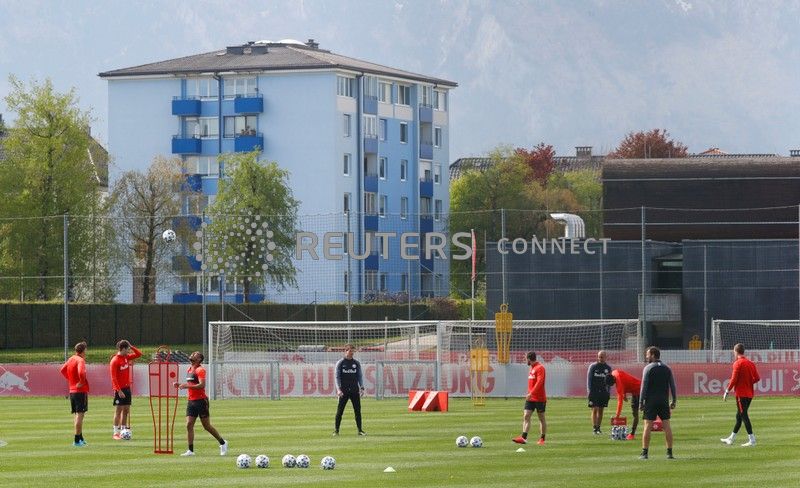(Reuters) – Austria’s professional soccer league will not be able to restart following the coronavirus outbreak if the government insists a whole team must be quarantined in the case of a player testing positive, its managing director told Reuters on Tuesday.
Christian Ebenauer said the government’s ruling was a “knockout blow” to the Austrian Bundesliga’s hopes of completing this season or even starting the next one.
He added that the dilemma of how to react when a player tests positive is one of the trickiest facing leagues around Europe as they attempt to start again.
Austrian clubs were allowed to restart training on April 20, raising hopes that the league could soon resume, albeit without spectators.
Medical guidelines drawn up by the Bundesliga proposed that a player who tested positive would be separated from the squad but that his team mates could continue training provided they tested negative.
“We had worked very hard in the last few weeks and had received positive signals from the sports minister so that we could start playing the Tipico Bundesliga again,” Ebenauer said in an interview.
“But then they told us that if a single player tested positive, then everyone on his team and, in the case of a match, the opposing team would have to spend 14 days in quarantine.
“That was a knockout blow, it was a huge disappointment. It is not possible for the league to operate with this requirement.”
He explained that, after quarantine, players would also have to train again before they could play another match.
“It’s a sword of Damocles,” he said. “Then you cannot have a championship.”
Ebenauer added that negotiations would continue with the government, however.
“We are thinking and working exhaustively on this and looking to see if there are other possibilities and present them to the sports ministry and health ministry… We still have hope that we will get the chance to play again.”
After talking to colleagues around Europe, he said it was a recurring theme, with many looking to see what Germany decides.
“The main issue is the question quarantine/no quarantine and an awareness that it won’t work if the players have to go into quarantine,” he said.
“That seems everywhere to be the key question and now we are all waiting to see what Germany decides, whether the whole team must go into quarantine or not. I think our government will be paying very close attention to what Germany does.”
Ebenauer added that so-called ghost games were far from ideal in Austria where 47% of the average club budget comes from sponsors and ticket sales and only 17% from television.
“We mustn’t forget that every ghost match costs every club money,” he said. “Clubs live from income from spectators and sponsors.
“So there is, of course, a difference between the clubs, as to whether ghost games actually make any sense or not and above all for how long they can survive on ghost games alone.”



